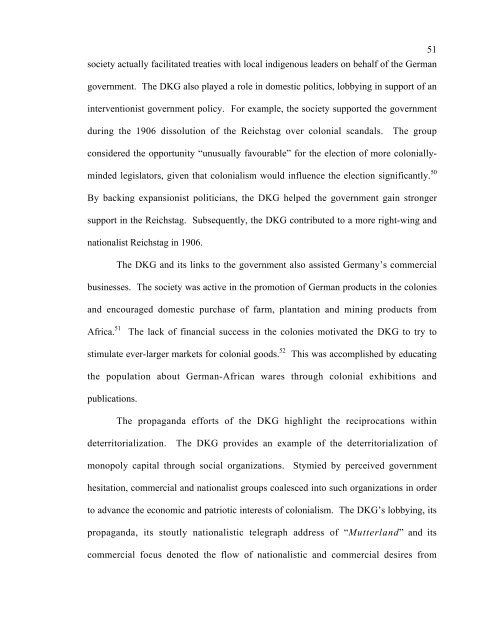A Deterritorialized History: Investigating German Colonialism ...
A Deterritorialized History: Investigating German Colonialism ...
A Deterritorialized History: Investigating German Colonialism ...
You also want an ePaper? Increase the reach of your titles
YUMPU automatically turns print PDFs into web optimized ePapers that Google loves.
society actually facilitated treaties with local indigenous leaders on behalf of the <strong>German</strong><br />
government. The DKG also played a role in domestic politics, lobbying in support of an<br />
interventionist government policy. For example, the society supported the government<br />
during the 1906 dissolution of the Reichstag over colonial scandals. The group<br />
considered the opportunity “unusually favourable” for the election of more colonially-<br />
minded legislators, given that colonialism would influence the election significantly. 50<br />
By backing expansionist politicians, the DKG helped the government gain stronger<br />
support in the Reichstag. Subsequently, the DKG contributed to a more right-wing and<br />
nationalist Reichstag in 1906.<br />
The DKG and its links to the government also assisted <strong>German</strong>y’s commercial<br />
businesses. The society was active in the promotion of <strong>German</strong> products in the colonies<br />
and encouraged domestic purchase of farm, plantation and mining products from<br />
Africa. 51 The lack of financial success in the colonies motivated the DKG to try to<br />
stimulate ever-larger markets for colonial goods. 52 This was accomplished by educating<br />
the population about <strong>German</strong>-African wares through colonial exhibitions and<br />
publications.<br />
The propaganda efforts of the DKG highlight the reciprocations within<br />
deterritorialization. The DKG provides an example of the deterritorialization of<br />
monopoly capital through social organizations. Stymied by perceived government<br />
hesitation, commercial and nationalist groups coalesced into such organizations in order<br />
to advance the economic and patriotic interests of colonialism. The DKG’s lobbying, its<br />
propaganda, its stoutly nationalistic telegraph address of “Mutterland” and its<br />
commercial focus denoted the flow of nationalistic and commercial desires from<br />
51
















